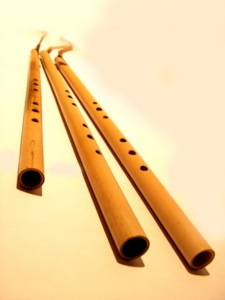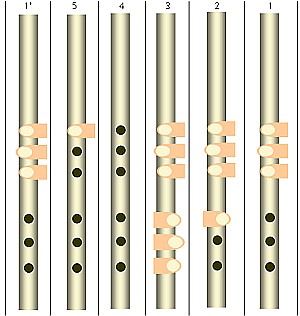

Suling - an Indonesian/Philippine flute made from bamboo. It is traditionally performed in gamelan ensembles.
Depending on the regional genre, a suling can be tuned into different scales. Sulings can be found in the following regions:
Sulings are made mainly of 'tamiang' bamboo (Schizostachyum blumei), a long tube bamboo with a which has very thin surface. The head of suling, near a small hole, is circled with a thin band made of rattan to produce air vibration.
There are two factors that affect a fine suling's tone:
The fingering position changes the wavelength of sound resonance inside the suling's body. Depending on the distance of nearest hole to the suling's head, different notes can be produced. The airflow speed also can modify the tone's frequency. A note with twice frequency can be produced mostly by blowing the air into suling's head's hole with twice speed.
In the Sundanese region, a suling is used as:
Sulings can have either 4 holes or 6 holes. The 6-holed Sundanese suling can play at least three different scales.
The following picture shows the fingering for a
six-holed Sundanese suling. 
And below is the example of 'more realistic' view of
finger positioning for the pelog degung scale.

Also called suling by the Tausug, Yakan, B'laan and Tiruray. Other names for the suling include the lantey (Ata), kinsi (Bukidnon), dagoyong (Higanon) and a babarak (Palawan)
The Maguindanaon suling is the smallest bamboo flute of the Maguindanaon and the only one classified as a ring-flute (the other two bamboo flutes of the Maguindanaon, the tumpong and the palendag are both lip-valley flutes). Air is passed through the suling via a blowing hole found at the bottom of the instrument and pitch is controlled via five finger holes on the top and one finger hole located on the bottom. Traditionally only the palendag was commonly played but because of the difficult nature of playing the palendag, both the tumpong and the suling have come to replace the palendag as the Maguindanaon’s most common aerophones.
![]() Back to Home
Page
Back to Home
Page